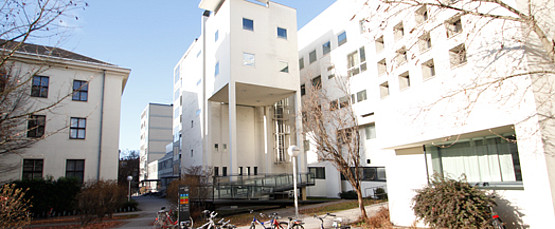FWF Project P28858
Solving bilinear inverse problems by tensorial lifting
One of the most frequent questions in science is “What caused this observed datum?”. For example, when measuring temperature with a thermometer, one actually asks the question “Which temperature caused the observed expansion of mercury?”. The datum is then the length of the column of mercury. In order to answer this question one needs a connection between the temperature and the length of the column, i.e. a model. A quick glance at a thermometer shows that the expansion is proportional to the temperature; such a model is called linear.
In a formal way, one asks: “Given a known model, which parameters of the model have caused the given data?”. This project strives to answer this question for models depending on a pair of parameters both of which have proportional influence on the data; in mathematical terms, to solve bilinear inverse problems. For example the process of taking pictures involves a pair of parameters, the true image and the aberration caused by the lens. The result is the obtained picture, with each parameter having proportional influence.
The solution of bilinear inverse problems is especially challenging, if the problem has the tendency to produce similar data for drastically different parameters. Clearly, in such case, noise or clutter inherent to every measurement setup highly impedes the ability to recover the true parameters responsible for the data. Unfortunately, this very kind of problems is very common in cutting edge problems arising in medicine, engineering and life sciences.
The project’s main aim is to provide, with mathematical stringency, a general framework for the solution of such problems. This begins with the thorough study of the properties of bilinear problems and it leads to the development of tools dearly needed by the practitioners dealing with bilinear problems.
The innovative core of the project is to combine three ideas: The first, main idea and the crucial method this project follows is to observe that all pairs of parameters can be considered special cases of a single parameter within a more general set of parameters. Further, it turns out that in that general set the problem becomes linear in the single parameter. This makes the problem far more accessible. We call this process tensorial lifting. However, solving the resulting problem can still be very challenging. Therefore, as the second ingredient, we incorporate a slight change of the problem, a so-called relaxation, which in the best case does not change the answer to the problem significantly. Finally, as the third part, the mathematical insights developed in this project are transferred to applications by means of novel solution schemes targeted towards the needs of practitioners of bilinear problems.
Publications
- R. Beinert, K. Bredies
Tensor-free proximal methods for lifted bilinear/quadratic inverse problems with applications to phase retrieval.
Foundations of Computational Mathematics, 21(5):1181-1232, 2021
(Open access, arXiv preprint: 1907.04875)
- R. Beinert, G. Steidl
Robust PCA via Regularized Reaper with a Matrix-Free Proximal Algorithm.
Journal of Mathematical Imaging and Vision, 63:626-649, 2021
(Open access, arXiv preprint: 2005.05449)
- R. Beinert, G. Plonka
One-Dimensional Discrete-Time Phase Retrieval.
Book chapter in: Nanoscale Photonic Imaging.
T. Salditt, A. Egner, D. R. Luke (eds.)
Springer, Cham. Topics in Applied Physics, vol. 134, Chapter 24, 603-627, 2020
(Open Access)
- R. Beinert, K. Bredies
Non-convex regularization of bilinear and quadratic inverse problems by tensorial lifting.
Inverse Problems, 35(1), 015002 (40 p.), 2019
(Open access, arXiv preprint: 1804.10524)
- R. Beinert, G. Plonka
Sparse phase retrieval of one-dimensional signals by Prony's method.
Frontiers in Applied Mathematics and Statistics 3(5), 2017
(Open access, arXiv preprint: 1701.08947)
- T. Bendory, R. Beinert, Y. C. Eldar
Fourier Phase Retrieval: Uniqueness and Algorithms.
Book chapter in: Compressed Sensing and its Applications.
H. Boche, G. Caire, R. Calderbank, M. März, G. Kutyniok, R. Mathar (eds.)
Birkhäuser, Cham. Applied and Numerical Harmonic Analysis, Capitel 2, 55-91, 2017
(Open access, arXiv preprint: 1705.09590)
- R. Beinert, G. Plonka
Sparse phase retrieval of structured signals by Prony's method.
Proceedings in Applied Mathematics and Mechanics 17(1), 829-830, 2017
(Open access)
Further activities
- SIAM Conference on Imaging Science (IS22)
21-25 March 2022 (virtual)
- Organization of the minisymposium: Variational Methods for Inverse Problems in Imaging
(10th International Conference on Inverse Problems: Modeling and Simulation)
22-28 May 2022 in Cirkewwa/Mellieha (Malta)
- Mathematics and Image Analysis MIA'21
11-13 January 2021 in Paris (France)
- GAMM 91th Annual Meeting
16-20 March 2020 in Kassel (Germany)
- IFIP Workshop on "Inverse Problems, Imaging, and Optimization"
6-8 January 2020 in Essen (Germany)
- Chemnitz Symposium on Inverse Problems
30 September-2 October 2019 in Frankfurt (Germany)
- SIAM Conference on Applied Algebraic Geometry
9-13 July 2019 in Bern (Switzerland)
- Applied Inverse Problems Conference
8-12 July 2019 in Grenoble (France)
- SPARS 2019
1-4 July 2019 in Toulouse (France)
- GAMM 90th Annual Meeting
18-22 February 2019 in Vienna (Austria)
- Chemnitz Symposium on Inverse Problems
27-28 September 2018 in Chemnitz (Germany)
- Mecklenburg Workshop "Approximation Methods and Fast Algorithms"
10-14 September 2018 in Hasenwinkel (Germany)
- Organization of the minisymposium: Bilinear and quadratic problems in imaging
(SIAM Conference on Imaging Science)
6 June 2018 in Bologna (Italy)
- SIAM Conference on Imaging Science (IS18)
5-8 June 2018 in Bologna (Italy)
- 9th International Conference on Inverse Problems: Modeling and Simulation
21-25 May 2018 in Cirkewwa/Mellieha (Malta)
- 89th GAMM Annual Meeting
19-23 March 2018 in Munich (Germany)
- 88th GAMM Annual Meeting
6-10 March 2017 in Weimar (Germany)
- Workshop: Shape, Images and Optimization
28 February-3 March 2017 in Münster (Germany)
- IFIP WG 7.4 Workshop on Inverse Problems and Imaging
19-21 December 2016 in Mülheim a.d. Ruhr (Germany)
- Imaging with Modulated/Incomplete Data
22-24 September 2016 in Graz (Austria)
